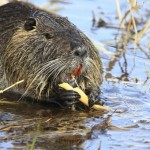Who Opposes Native Seed Bills? Native Seed Sellers

NORBERTO DUARTE AFP
A man shows stevia plant seeds, known as "sweet herb." In Texas, a couple new bills could ramp-up production and use of native seeds across the state.
A few individuals from around Texas took the opportunity to travel to the Capitol and speak out against two native seed bills at the House Livestock and Agriculture Committee meeting Wednesday.
And those who kindly opposed the legislation were native seed distributors themselves.
While the distributors were glad the state government is championing the native seeds cause, some weren’t sure these bills would be the right way to tackle a native seed supply-side gap.
Dean Williams, who proclaimed he was voted “most likely to sack seed” as a youth and is now president of 101-year-old Douglass King Seed Company, thought the grant program could have a detrimental effect on the native seed business.
“If we split the funding up on the pie, which I understand is what it’s all about, we will have underfunded programs going that are going to dilute the system and slow it down,” said Williams, who registered himself as against the legislation.
Rep. Mike Villareal, D-San Antonio, has filed the two bills. One, HB 1116, would create a Texas Native Seed Competitive Grant Program to fund and promote native seed growth at a public university or similar institution. A second bill, HB 1135, would create a Native Seed Committee tasked with making a master plan to proliferate native seeds around the state.
A major focus of the bills would be revegetating the destroyed land left behind by highway construction and from oil and gas exploration.
Villareal said the Texas Department of Transportation (TXDOT) is already federally mandated by the Clean Water Act to revegetate roadsides after projects, and would like to use native seeds, but due to supply gaps the department sometimes uses invasive species for the job.
Those invasive species can overwhelm natives and creep into nearby farmland. Invasives are also more susceptible to Texas’ extreme climate, while natives are adapted to drought, authorities testified.
Some of TXDOT’s native seed needs are met by a Texas A&M University, Kingsville program that supplies seeds for replanting in South and West Texas, he added.
TXDOT already voluntarily spends about $500,000 a year, since 2001, on native seed restoration and research. That money goes in part to A&M Kingsville, said John Barton, Deputy Executive Director of the Department of Transportation.
Villareal told StateImpact Texas in a previous interview that a ballpark figure for his grant program is about $1 million.
Denise Gentsch, Legislative Director of the Texas Seed Trade Association, said seed distributors in Texas already work with government authorities on native seed research and distribution. Her association, which consists of 125 businesses including three native seed businesses, supports those efforts as they currently exist.
As for the new bills, “we respectfully wish to oppose this legislation because we do feel there is a process currently in place,” Gentsch said.
Those that spoke against the legislation still praised the overarching goal of the bills: to bring real Texas plant life back to the state.
A self-described “city boy,” Villareal said he was spurred to author the legislation after learning about the merits of native seeds from a constituent.
“I came to appreciate how important it is for us to conserve our native vegetation because it is the bottom rung of our food chain,” Villareal said at the meeting. “And if we lose that we start eroding the rest of the wildlife that is native to Texas.”
Rep. Charles “Doc” Anderson, R-Waco, Vice Chairman of the House Livestock and Agriculture Committee, with his cowboy hat sitting next to him on the elevated panel, used his power of inquiry to inject some levity into the meeting during Villareal’s testimony.
“Are these things ground up before they’re smoked?” Anderson asked.
“I think they come in a small plastic bag,” Villareal replied.
